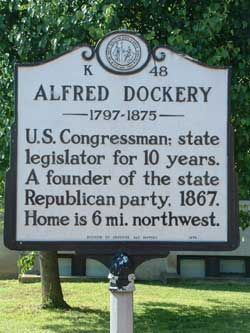 “The disunion mania which now pervades the breasts of so many Southern men progresses with unprecedented rapidity, and like the devastating tornado threatens to prostrate all in the dust.”
“The disunion mania which now pervades the breasts of so many Southern men progresses with unprecedented rapidity, and like the devastating tornado threatens to prostrate all in the dust.”
So declares Alfred Dockery (1797-1873), slaveholder, leader among North Carolina Baptists, a general in the N.C. Militia, a state senator, and a U.S. Congressman.
As a Baptist, Dockery was present in 1833 when the North Carolina Baptist State Convention met at Cartledge Creek Baptist Church and voted to found Wake Forest Institute, which would later become Wake Forest University.
Yet Dockery was an avowed Unionist. Two days prior to proclaiming his sentiments regarding the growing secessionist movement, Dockery had been one of only nine state senators (out of 46 total) who voted against holding a secession convention in North Carolina.
And on April 22, 1861,gathered with prominent Richmond County leaders at the local courthouse, Dockery stood as the lone man who refused to discuss preparations for North Carolina’s defenses against Union forces. North Carolina seceded on May 20. Six of Dockery’s sons fought for the Confederacy, but Alfred remained a Unionist.
The following year, Dockery declared, “I have all along and still entertain the opinion that our national troubles might and ought to have been adjusted without the infamous war in which we are involved. I feel confident that when the insanity of the present day shall have passed away, millions both North and South will concur in this opinion.”
Despite his devotion to the Union, in 1864 the Fayetteville Observer stated that Dockery remained “one of the truest Conservatives and one of the worthiest citizens of the State.”
On March 1865, Sherman’s army marched through Richmond County. Falling back, Confederate General Joseph Wheeler on March 8 established temporary headquarters at Dockery’s house – at Dockery’s invitation. Later than month, as Union forces took control of Richmond, they torched all the homes and plantations of southern sympathizers – but left Dockery’s mansion untouched.
According to Elizabeth Covington, historian of Cartledge Creek Baptist Church and author of A Brief History of Cartledge Creek Baptist Church, 1774-1974, Alfred Dockery treated his slaves very well, teaching them to read the Bible and providing them an education: “He told them if they would learn to read a certain number of chapters in the Bible and to write, he would free them.” After the war, when all Dockery’s slaves were free, some chose to remain on his plantation, until “General Dockery called them all together and said they had to leave. So he gave them all a mule and an acre of land.”
Afterwards, in 1867 Dockery became a founder of North Carolina’s Republican Party and in 1869 helped former slave members of Cartledge Creek Baptist Church in the founding of Holly Grove Missionary Baptist Church.
Also today, Louisiana secedes from the United States of America.
Note: According to Covington, the death date on the historical marker pictured above is incorrect.
(Sources: Cartledge Creek: 285 Years of History and How Did Dockery Home Survive Civil War?)


